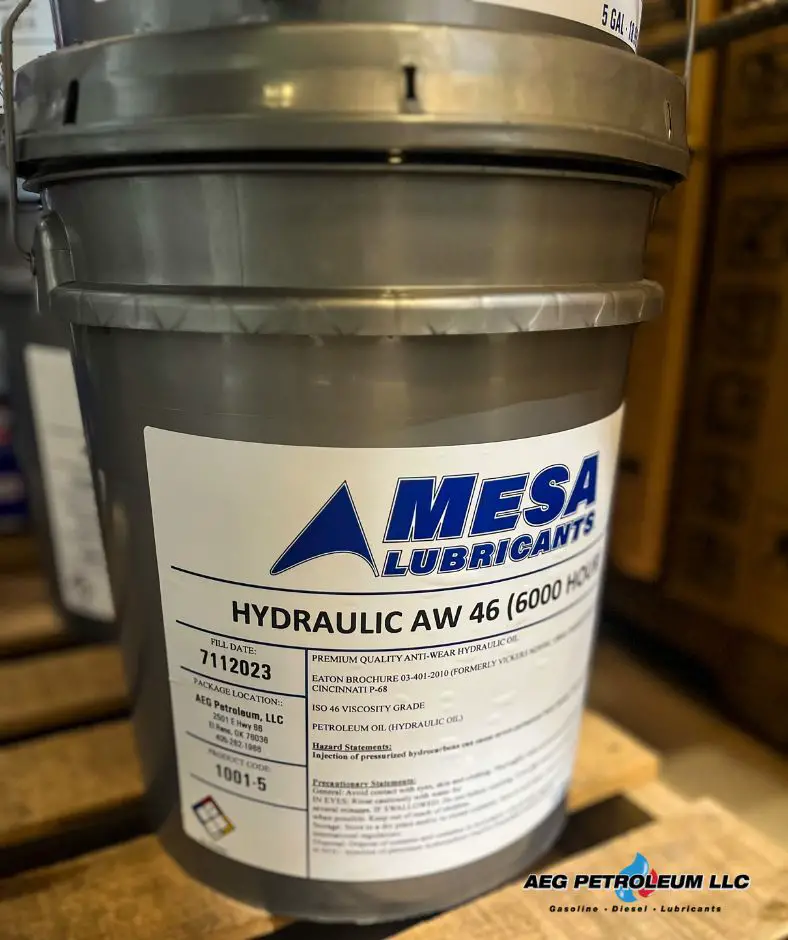Iso 46 and AW 46 hydraulic oils have similar viscosity grades for hydraulic systems and both offer reliable lubrication properties. These oils are used in various industrial machinery and equipment to ensure smooth operation and reduce friction.
Choosing between Iso 46 and AW 46 depends on specific application requirements and equipment manufacturer recommendations. Understanding the differences between the two oils can help you make an informed decision for optimal performance and longevity of your hydraulic systems. We will explore the key characteristics of Iso 46 and AW 46 hydraulic oils to help you determine which option is best suited for your machinery needs.
Let’s dive in to discover the essential features and benefits of each type of hydraulic oil.

Key Differences Between Iso 46 And Aw 46 Hydraulic Oil
Key Differences Between ISO 46 and AW 46 Hydraulic Oil
Viscosity
ISO 46 and AW 46 differ in their viscosity ratings.
Additives
Various additives are present in both oils for enhancing performance.
Application
The application of ISO 46 and AW 46 depends on the equipment requirements.
Performance
Performance of ISO 46 and AW 46 can vary based on specific conditions.

Credit: engineoilinsights.com
Advantages Of Iso 46 Hydraulic Oil
ISO 46 hydraulic oil provides several advantages, making it a popular choice in various industrial applications. Let’s explore the benefits of using ISO 46 hydraulic oil in hydraulic systems:
Higher Viscosity Index
ISO 46 hydraulic oil has a higher viscosity index, indicating its ability to maintain consistent viscosity over a wide temperature range.
Better Oxidation Stability
ISO 46 hydraulic oil exhibits better oxidation stability, which helps prevent the formation of harmful sludge and varnish deposits.
Improved Lubrication
ISO 46 hydraulic oil offers improved lubrication properties that reduce friction and wear on hydraulic components.
Enhanced Thermal Stability
ISO 46 hydraulic oil boasts enhanced thermal stability, ensuring efficient operation even at high operating temperatures.
Advantages Of Aw 46 Hydraulic Oil
When it comes to choosing the right hydraulic oil for your machinery, AW 46 Hydraulic Oil stands out with several important advantages that can greatly benefit your equipment and operations. Let’s explore these advantages in detail:
Anti-wear Properties
AW 46 Hydraulic Oil comes with exceptional anti-wear properties, ensuring that your machinery operates smoothly and efficiently. It forms a protective barrier on the metal surfaces, reducing friction and preventing wear and tear, even under high-pressure conditions. This means your equipment experiences fewer breakdowns and can operate optimally for extended periods of time.
Improved Water Resistance
One of the biggest advantages of AW 46 Hydraulic Oil is its improved water resistance. Water contamination in hydraulic systems can cause severe damage, resulting in reduced performance and increased maintenance costs. However, with AW 46 Hydraulic Oil, the formulation provides excellent resistance against water, helping to keep your equipment protected and functioning optimally, even in wet conditions or environments.
Extended Service Life
With AW 46 Hydraulic Oil, you can expect an extended service life for your machinery. The oil’s high-quality additives and superior formulation help to reduce oxidation and deposit formation, ensuring the oil maintains its performance over time. This not only saves you money on frequent oil changes but also allows your equipment to operate reliably for longer periods without any compromise in performance or efficiency.
Reduced Friction And Wear
Another significant advantage of AW 46 Hydraulic Oil is its ability to minimize friction and wear. The oil’s unique properties create a thin lubricating film on the metal surfaces, resulting in reduced friction and wear. This translates to improved efficiency, smoother operation, and ultimately less wear and tear on your machinery. As a result, you can expect reduced maintenance requirements and increased productivity.

Credit: engineoilinsights.com
How To Choose Between Iso 46 And Aw 46 Hydraulic Oil?
When it comes to choosing the right hydraulic oil for your equipment, understanding the differences between ISO 46 and AW 46 hydraulic oils is crucial. Each type has its own unique properties and specifications that can affect the performance and longevity of your hydraulic system. In this article, we’ll delve into the factors you need to consider when deciding between ISO 46 and AW 46 hydraulic oil.
Equipment Requirements
Every hydraulic system has specific requirements when it comes to the type of hydraulic oil it can use. ISO 46 hydraulic oil is suitable for applications where a wider temperature range is necessary, and it provides excellent oxidation resistance. On the other hand, AW 46 hydraulic oil contains anti-wear additives and is designed to protect hydraulic systems from wear, rust, and corrosion. Depending on the equipment specifications, you need to choose the oil that best meets these requirements.
Operating Conditions
The operating conditions of your hydraulic system play a significant role in determining the type of hydraulic oil to use. If your equipment operates in extreme temperatures or experiences heavy loads, ISO 46 hydraulic oil may be the better choice due to its broader temperature tolerance. Conversely, AW 46 hydraulic oil is ideal for heavy-duty applications where wear protection is crucial.
Manufacturer Recommendations
It’s important to consider the recommendations of the equipment manufacturer when selecting hydraulic oil. Some manufacturers specify the type of hydraulic oil that should be used to ensure optimal performance and longevity of the equipment. Always adhere to the manufacturer’s guidelines to avoid potential issues and maintain warranty coverage.
Budget Considerations
While both ISO 46 and AW 46 hydraulic oils offer distinct advantages, budget considerations also come into play. AW 46 hydraulic oil tends to be more cost-effective due to its anti-wear properties that can minimize equipment maintenance and extend the lifespan of components. On the other hand, ISO 46 hydraulic oil may require less frequent oil changes, potentially reducing long-term maintenance costs.

Credit: www.unisan.com
Frequently Asked Questions On Iso 46 Vs Aw 46 Hydraulic Oil
What Is The Difference Between Iso 46 And Aw 46 Hydraulic Oil?
The main difference lies in the additives. AW 46 includes anti-wear additives, while ISO 46 does not. Additives in AW 46 provide better protection against wear and tear, making it suitable for heavy-duty applications.
Can Iso 46 Substitute For Aw 46 Hydraulic Oil?
Yes, ISO 46 can substitute for AW 46 in certain hydraulic systems. However, it’s crucial to consult with equipment manufacturers and consider operating conditions before making the switch to ensure compatibility and optimal performance.
Which Type Of Hydraulic System Is Compatible With Aw 46 Oil?
AW 46 is ideal for hydraulic systems that require anti-wear protection, such as those in heavy machinery, construction equipment, and industrial hydraulic systems. Its additive composition helps prevent metal-to-metal contact and minimizes wear under high pressure and load conditions.
How Does Iso 46 Hydraulic Oil Perform In High-temperature Environments?
ISO 46 hydraulic oil performs well in high-temperature environments due to its stable viscosity characteristics. It resists thinning at elevated temperatures, ensuring proper lubrication and protection, making it suitable for applications where temperature fluctuations are common.
Conclusion
To summarize, understanding the difference between ISO 46 and AW 46 hydraulic oil is crucial for optimal performance of your machinery. While ISO 46 is known for its excellent oxidation and thermal stability, AW 46 offers additional protection against wear and corrosion.
Ultimately, the choice between the two depends on your specific equipment requirements and operating conditions. By selecting the right hydraulic oil, you can ensure smoother operations, reduce downtime, and prolong the lifespan of your machinery.